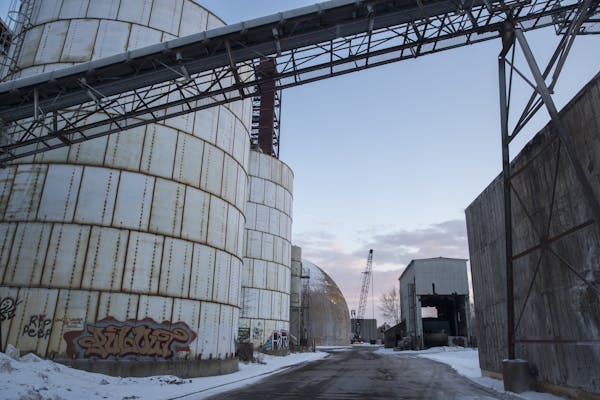Gov. Mark Dayton signed off Wednesday on nearly $1.5 billion for aging roads, bridges and other state infrastructure, saying the importance of keeping up public assets outweighed his qualms about which projects made the cut.
Dayton's decision to sign the public works bonding bill left the DFL governor and the Republican-led Legislature with a major accomplishment in a legislative session with few others. Among dozens of other projects, the bill includes $25 million for public schools around the state to bolster safety measures — a bipartisan priority following recent school shootings in Florida and Texas.
"I am signing this bill, despite my objections, because areas throughout Minnesota need the projects and the jobs, which it will provide," Dayton said.
Last week, the governor vetoed several GOP-crafted bills that included tax relief, money for public schools and to fix the state's troubled vehicle licensing system, and a handful of high-profile policy changes.
Echoing his earlier outrage at Republicans for the contents of the bills he vetoed, Dayton said he was signing the public works package for the worthwhile projects it includes — even though he thinks it doesn't do enough for public universities, state parks, mass transit, and other areas.
"[The bill] is seriously unresponsive to the urgent needs for capital investments in new, old and very old public facilities throughout our state," Dayton wrote in a letter to GOP legislative leaders. "Minnesota's social and economic vitality will suffer from this underinvestment in the years ahead."
The public works package leverages the borrowing capacity of state government with $825 million in general obligation bonds; the rest comes from other state funds. Dayton line-item vetoed a single provision in the bill: A $1 million grant for an analysis of water quality regulations, which he called an "unnecessary redundancy."
Republican lawmakers who helped craft the bill were happy to have at least one major accomplishment to tout to constituents.
Rep. Dean Urdahl of Acton Township, chairman of the House Capital Investment Committee, called it "a very good package which features geographic balance, sticks to the priorities and focuses on infrastructure — all while respecting the taxpayers."
The bill allocates $208 million for higher education construction projects, $178 million for preservation work on state buildings and properties and $123 million for water quality projects.
The largest portion of the funding, $542 million, will go toward transportation projects. Among them: a highway interchange project at Hwy. 9 and Interstate 494 in Plymouth, a reconstruction of a section of Hwy. 169 near Mankato and an environmental cleanup along Hwy. 10 in Wadena. Minneapolis will get $1 million to assess repairs to the landmark Stone Arch Bridge, which officials recently warned was in danger of needing to be closed unless it received an infusion of repair funds.
The Department of Human Services will receive $37 million for work on treatment centers in Anoka and St. Peter, and for regional behavioral crisis programs in other parts of the state. Close to $110 million will be dedicated for economic development projects and programs ranging from the Second Harvest Heartland food bank ($18 million) to a public television station in Austin ($2.5 million) to St. Paul's deteriorating RiverCentre parking ramp ($5 million.)
Another $32 million will be used to build veterans' homes in Bemidji, Montevideo and Preston. Fort Snelling's Visitor Center will get $15 million, and the Minnesota Zoo will receive $6 million.
"It's a perfect combination of investments to rebuild safer roads, maintain statewide infrastructure, care for our veterans, and address mental health emergencies," said Senate Majority Leader Paul Gazelka, R-Nisswa. "It's big enough to make a significant difference in Minnesotans' lives, but not so big to put future budgets at risk."
'Dangerous precedent'
In his letter, Dayton criticized Republican leaders for failing to provide any money for transit projects, calling the move "ignorant and irresponsible."
Dayton said at a news conference Wednesday that GOP lawmakers let politics guide decisions about which projects to include and how much money to borrow. While Dayton sought $1.5 billion in projects entirely funded by bonds, the GOP plan uses $825 million in bonds and the rest from other sources that include a trust fund meant for environmental projects, and the state's budget reserve.
It's a "dangerous precedent," Dayton said.
He wielded his veto pen on four other bills on Wednesday, including a Metropolitan Council restructuring and a measure to make people liable if they associated with plans to protest or interfere with "critical infrastructure" such as oil pipelines. Another vetoed bill would have imposed changes on the state's problem-plagued new vehicle licensing system, but the governor said the Legislature did not provide funding to make those changes.
Finally, Dayton vetoed a bill that would have removed current water quality standards for sulfates in areas that produce wild rice. He issued an executive order setting up a new wild rice task force that will be asked to offer recommendations by the end of the year.
Erin Golden • 612-673-4790

Supreme Court seems skeptical of Trump's claim of absolute immunity but decision's timing is unclear
The Latest | Cross-examination of ex-tabloid publisher begins in Trump hush money trial

